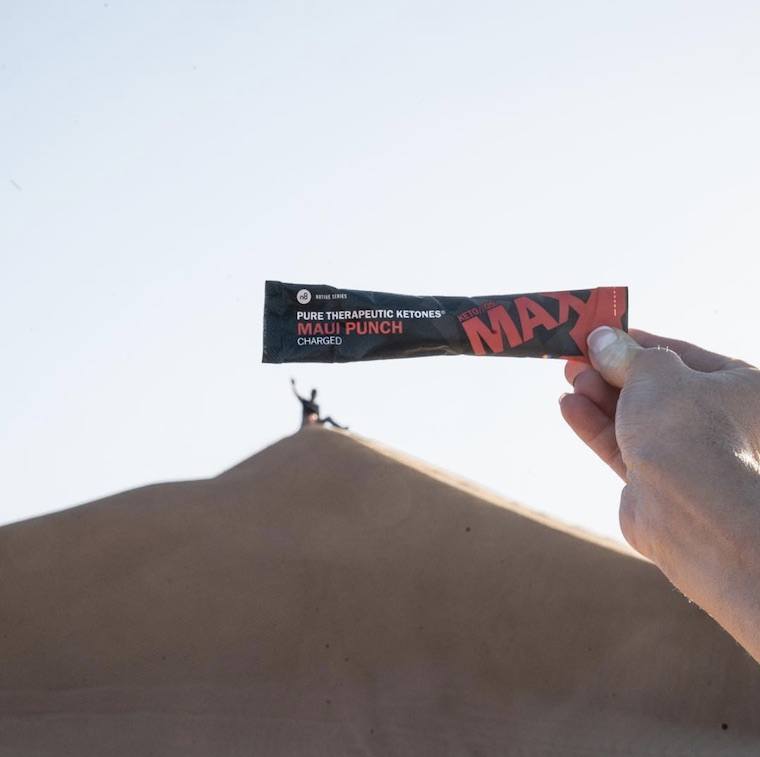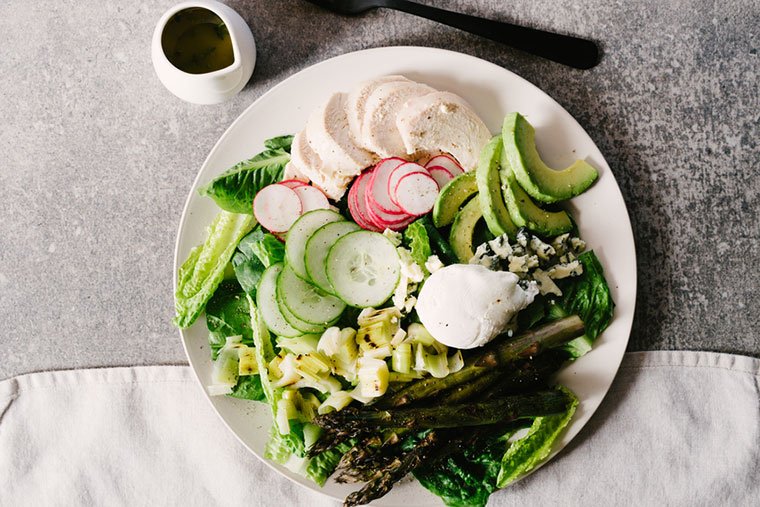Sounds like a dream, right? Not necessarily. Sticking to this diet, which helps your body burn fat for fuel through a process called ketosis, can be a lot harder and less fun than it sounds. (It's not all guacamole and almond butter, after all—you’ve also got to cut out virtually all grains, starchy veggies, alcohol, and sugar. Ugh.)
“It takes a few days to get into ketosis and you have to be committed to it very seriously,” explains holistic nutritionist and Body Love author Kelly LeVeque, CN, whose clients include Jessica Alba and Molly Sims. “Let’s say you try and get into ketosis [early in the week] and you get in by Thursday. But by Friday, if you drink a glass of wine, you’re out. It doesn’t work for most people’s lifestyles, and it can make you a little obsessed with food.”
Because of this, many keto diet devotees are turning to exogenous ketones—supplements that are said to help the body achieve ketosis more quickly and efficiently than diet alone, supposedly allowing you to be a little more relaxed on the food front. But are they legit?
Read on for the low-down on exogenous ketones—what they are, how to use them properly, and how to know whether they’re right for you.

What are ketones, anyway?
LeVeque refers to ketones as the “fourth macronutrient.” By this, she means they’re a source of energy for your body and brain, similar to protein, fat, and carbohydrates.
“When you eat fat and you don’t have any carbohydrates, you metabolize fat in your liver and it gives off three different types of ketones,” she explains. “Ketones are chemical messengers that tell your body to burn fat; they're also a byproduct of burning fat. And the ketone that becomes fuel for your body is called beta-hydroxybutyrate.”
Ketone supplements, like those from Pruvit and Kegenix, are essentially beta-hydroxybutyrate that was created in a lab. “Taking [these supplements] is basically putting pure ketones into your bloodstream,” LeVeque explains. In other words, it's a shortcut to the biochemical effect you get from eating the ketogenic diet—and fans of these supplements say they bestow all the same benefits, from more energy and better sleep to weight loss and elevated mood. “Ketones are anti-cancer, they’re anti-inflammatory, and they’re just a cleaner source of fuel than carbs, which can cause your energy to crash,” adds LeVeque.
In most cases they come in powdered-drink form, which you can mix with water or any other beverage.

{{post.sponsorText}}

But wait, there’s a catch
No, you can’t just drink a packet of ketones, continue to eat French fries and pizza, and expect a six-pack and laser-like mental focus. (They're like anything else in wellness—if it sounds too good to be true, it probably is.)
“One of the biggest mistakes out there is that people will try to do ketones and add saturated fat to their diet, but then they don’t pull back on the carbohydrates,” says LeVeque. “That together can create an increase in weight gain.” For best results, she adds, you should be following a mostly ketogenic diet, wherein you get about 80 percent of your calories from fats, 15 from protein, and 5 from carbs. From there, exogenous ketones will help amplify the diet's effects.
Kim Crawford, MD, believes you'll have the most success with exogenous ketones if you've been following the keto diet strictly for at least a month. “Where I see the real role for exogenous ketones is after your body becomes keto adapted, which takes about four to six weeks of following a nutritional-ketosis diet,” she says. “If you’re not keto adapted and you think ‘Oh, I can break ketosis and take some beta-hydroxybutyrate,’ it may take you three or four days to get back in. You’re wasting your money if you don’t understand this concept.”
And let’s be clear, ketones are an investment. For instance, a 15-day supply of Kegenix ketones is $49.99, while 15 servings of Pruvit’s Keto//OS supplement, which LeVeque considers the gold standard, start at $85.

How to use exogenous ketones
There are a few different scenarios in which exogenous ketones can be extra helpful. For one thing, when you’re first transitioning to a low-carb/high-fat diet, you’re at risk for experiencing the keto flu, says LeVeque. “There’s a period in the beginning when you’re trying to get into ketosis that sort of sucks,” she says. (It’s all part of your body learning to thrive on a new fuel source.) “You may feel a little bit lightheaded, because you’re used to having carbs.” Her clients have found that taking ketones makes this process a little easier.
LeVeque says ketone supplements can also be a powerful way to curb cravings, since they’re a natural appetite suppressant. “If someone seriously wants to do ketosis, I have them taking two packets of ketones a day—one between breakfast and lunch, and one between lunch and dinner,” she says. “It’s the perfect bridge snack to add fuel to your brain. Or other people will use them as a way to intermittent fast until lunch time, as a support tool with Bulletproof coffee or eggs and avocado.”
And once you’ve been eating keto for a while, Dr. Crawford says exogenous ketones can help you bounce back into fat-burning mode following a carb-heavy meal. (This is good for your gut health, she says, since a lack of dietary fiber may disrupt the mucus and microbiome in the gut.) “Every two weeks I advise my patients to have a high-carb dinner; other physicians recommend having a high-carb day,” she says. “If you’re taking ketones, the next morning you can go right back into ketosis.”
Just make sure you’re buying the cleanest ketones possible, Dr. Crawford warns. “Look at the label—there’s a lot of junk in some of these powders, like artificial colors and flavors,” she says. “You want something that’s non-GMO, GMP-certified, and as pure as you can get.” Basically, the same kind of rules that apply to the grass-fed ghee in your butter coffee—the OG keto diet hack.
The keto diet may also have some mental health benefits, according to recent research. Here's what happened when one Well+Good editor tried it for anxiety.
Loading More Posts...